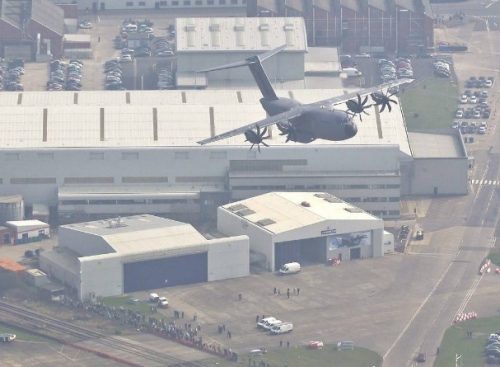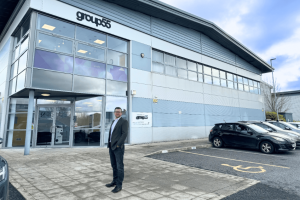Airbus remains confident after first quarter results, although tariffs add ‘complexity’

Aircraft manufacturer, Airbus, reported improved revenues, although earnings before interest and tax (EBIT) fell during its first quarter period, ended March 31, 2025.
Wings for Airbus commercial aircraft are manufactured at the group’s factory in Broughton, near Chester, which employs around 4,500 staff. The group also employs more than 2,700 staff in Filton, near Bristol.
Consolidated figures for the reporting period showed sales rose six per cent to €13.542bn, while EBIT was €473, compared with €609m the previous year.
Net income was €793m, a 33% increase, while free cash flow improved from a €1.799bn deficit in 2023 to a €296m deficit for 2024.
Net cash stood at €10.966bn, against €11.753bn a year ago. The total number of employees rose by one per cent to 157,894 staff.
Chief executive, Guillaume Faury, said: “Our Q1 results demonstrate the progress we are making on our priorities across the business.
“We are ramping up production in line with our plan but the delivery profile will be backloaded, reflecting the specific supply chain challenges we are facing this year,”

Guillaume Faury
He added: “We maintain the guidance that excludes tariffs which are adding complexity and remain uncertain in terms of implementation, scope and duration.
“We are closely monitoring and assessing the situation, but it is too early to quantify the impact today.”
Airbus also operates a helicopters division, and he said: “When it comes to our defence activities, we support the recent approach to strengthen the European defence industry and we stand ready with our broad portfolio of products and solutions to respond to our customers’ requirements.”
Gross commercial aircraft orders totalled 280, up from 170 the same time last year, with net orders of 204 aircraft after cancellations (Q1 2024: 170 aircraft).
The order backlog amounted to 8,726 commercial aircraft at the end of March 2025. Airbus Helicopters registered 100 net orders (Q1 2024: 63 units), which were well spread across the product range.
Order intake by value at Airbus Defence and Space increased to €2.6bn (Q1 2024: €2bn), reflecting good momentum across its business lines for both platforms and services.
A total of 136 commercial aircraft were delivered (Q1 2024: 142 aircraft), comprising 17 A220s, 106 A320 family, 4 A330s and nine A350s.
Revenues generated by Airbus’s commercial aircraft activities increased four per cent to €9.5bn, mainly reflecting a more favourable foreign exchange environment which was partially offset by the lower number of deliveries.
Revenue from Airbus Helicopters increased by 10% to €1.6bn, reflecting a solid performance from programmes and growth in services. Helicopter deliveries totalled 51 units (Q1 2024: 50 units).
Revenues at Airbus Defence and Space increased 11% year-on-year to €2.7bn, driven by higher volumes across its business lines.
The A320 family programme continues to ramp up towards a rate of 75 aircraft per month in 2027
The company is stabilising the A330 monthly production rate at around four. Specific supply chain challenges, notably with Spirit AeroSystems, are currently putting pressure on the ramp up of the A350 and the A220. The company said it continues to target rate 12 for the A350 in 2028 and a monthly A220 production rate of 14 aircraft in 2026.
Airbus Helicopters’ EBIT adjusted increased to €78m (Q1 2024: €71m), reflecting the solid performance in programmes and services growth. In March, the new H140 multi-mission helicopter was introduced and received its first orders and commitments.
EBIT adjusted at Airbus Defence and Space amounted to €77m (Q1 2024: €-9m), reflecting higher volumes and improved profitability mainly for Air Power services and Connected Intelligence.
On the A400M programme, the company remains in constructive discussions with the launch nations and OCCAR on the production plan.
In light of uncertainties regarding the level of aircraft orders, Airbus continues to assess the potential impact on the programme’s manufacturing activities. Risks on the qualification of technical capabilities and associated costs remain stable.
Looking ahead, the group said, as the basis for its 2025 guidance, it excludes the impact of tariffs on its business.
Its 2025 guidance includes the impact of the integration of certain Spirit AeroSystems work packages based on preliminary estimates and an assumed closing in the third quarter of 2025.
The company assumes no additional disruptions to global trade or the world economy, air traffic, the supply chain, its internal operations and ability to deliver products and services.
On that basis, the company targets to achieve in 2025 are around 820 commercial aircraft deliveries, EBIT adjusted of around €7bn and free cash flow before customer financing of around €4.5bn.
The anticipated impact of the integration of certain Spirit AeroSystems work packages on the company’s guidance remains in line with previous estimates.








